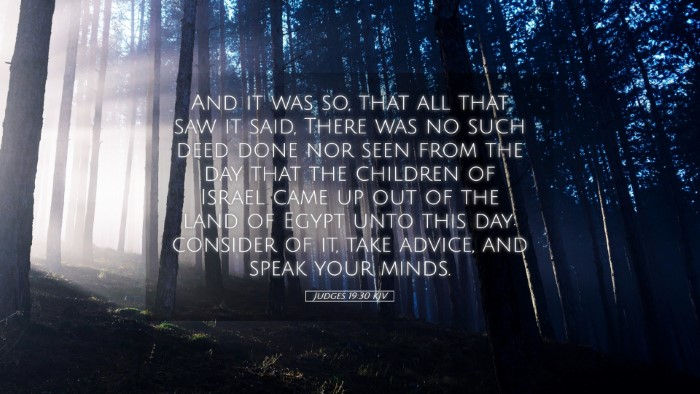Commentary on Judges 19:30
Introduction
The Book of Judges presents a reflective narrative on the cyclical history of Israel, portraying the decline of their moral and spiritual standards after the conquest of Canaan. Judges 19:30 serves as a significant verse that encapsulates the tragedy and moral decay of this period. This commentary will explore the verse through insights from various public domain commentaries including Matthew Henry, Albert Barnes, and Adam Clarke.
Contextual Background
The context of Judges 19 is crucial for understanding this verse. It details a horrific account involving a Levite and his concubine. After the Levite's concubine is abused and dies, he dismembers her body and sends the pieces to the twelve tribes of Israel as a call to action against such atrocity (Judges 19:29). This sets the stage for the concluding verse, which encapsulates the destructive consequences of moral failures within the nation of Israel.
Verse Analysis: Judges 19:30
Judges 19:30 states: "And it was so, that all that saw it said, There was no such deed done nor seen from the day that the children of Israel came up out of the land of Egypt unto this day: consider of it, take advice, and speak your minds."
Moral Outcry and its Implications
According to Matthew Henry, this verse reflects a collective horror and disbelief among the onlookers regarding the heinous act. It signifies a turning point where the people are compelled to confront the depth of depravity that has taken root in their society. Henry emphasizes that such a proclamation is a reminder of the moral standards that Israel was once called to uphold.
The Historical Context
Albert Barnes provides insight into the historical comparison made in the verse, noting that the Levite’s actions and the public's reaction serve as a stark reminder of Israel's covenant relationship with God. The reference to the beginning of their national journey from Egypt indicates a profound shift away from their initial commitments to divine holiness and justice.
The Call for Reflection
In Adam Clarke's commentary, he highlights the importance of the phrase "consider of it, take advice, and speak your minds." Here, Clarke interprets this as an urgent call for introspection and communal responsibility. The act of dismembering and sending parts of the concubine's body illustrates drastic measures taken to evoke a reaction, pushing the community to contemplate their moral standing.
Theological Reflection
This verse invites a theological reflection on the state of societal values and the consequences of moral decay. The shocking nature of the Levite's actions serves to highlight how far Israel had strayed from God's intended order. Each commentary contributes to understanding that when moral absolutes are abandoned, communities inevitably face chaos and violence.
The Importance of Communal Moral Standards
Henry discusses the need for a societal framework that maintains justice and righteousness as central tenets. He posits that the ease with which moral lines can be blurred signals a warning for today’s believers and congregations alike. The collective response of the people at this moment becomes a microcosm of how societies ought to confront wrongdoing.
The Dangers of Disengagement
Barnes draws attention to the sociological implications of disengagement from community responsibilities. He warns that when individuals refrain from taking a stand against evil, they implicitly permit its spread. This is particularly resonant in modern contexts where passive responses to immorality can lead to further degradation.
Awareness and Action
Clarke's emphasis on the calls to action—consideration, discussion, and decision—is essential for the church today. It stresses the need for discernment among believers regarding social and ethical issues. Clarke argues that apathy in the face of injustice is as culpable as the actions themselves, illuminating a critical call for vigilance in preserving faith and integrity in communities.
Practical Application
The lessons derived from Judges 19:30 are manifold, particularly for pastors, students, theologians, and scholars seeking to apply biblical principles to their teaching and ministry.
- Encouragement of Open Dialogue: Pastors should foster environments within their congregations where open dialogue about moral issues is encouraged, helping to discern biblical perspectives amidst cultural noise.
- Call to Reflect on Community Standards: The church is urged to take a hard look at its moral framework and the standards it upholds. Discussing the implications of societal norms versus biblical standards can be enlightening.
- Mobilization for Justice: As seen in the reaction of the Israelites, there is an inherent responsibility to address and mobilize against injustice in society. The call for the congregation to consider these issues can inspire combined efforts toward social justice rooted in biblical teachings.
Conclusion
Judges 19:30 serves as a powerful reminder of the need for moral vigilance and communal responsibility. The insights from Henry, Barnes, and Clarke emphasize a united stand against immorality while calling for personal and societal reflection. The church today continues to face challenges akin to those faced by Israel in the days of the Judges; hence, the exhortation to heed spiritual and moral clarity is more critical than ever.


